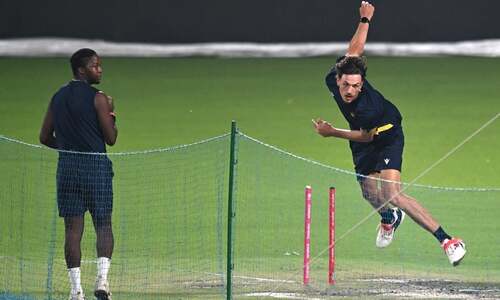WHEN a fellow-Chakwali makes it big I feel happy and bask vicariously in his glory. When he makes it big on the strength of what someone versed in the military arts might call bluff and bluster I feel happier still because straight virtue I have always found boring. It is the buccaneering spirit which catches my fancy.
I write all this after not knowing whether to laugh or to cry at the splash in the papers made by Maulana Muhammad Akram Awan's 'threat' to march on Islamabad with lakhs of his followers to press for the promulgation of Islamic laws in the country. With such consummate skill and exquisite sense of public relations has the Maulana orchestrated this threat from his stronghold of Munara (which is at one end of Chakwal tehsil) that he has had the puissant government of Punjab reeling on its feet. It was not surprising therefore if it sent two of its most important officials - Home Secretary Brig Ejaz Shah and Inspector-General of Police Malik Asif Hayat to parley with him. After protracted negotiations a nation caught in suspense was informed that the Maulana had graciously agreed to defer storming the capital till early March pending the acceptance of his demands.
Nor was this all. Dr Mahmood Ghazi, General Musharraf's in-house bishop, also travelled to Munara to talk to the Amir of the Tanzeemul Akhwan, an organization which (you will have to take my word for it) has less of a presence in Chakwal than on the front pages of the national press. Thus it is that what might suitably have been handled by the In-charge Police Post Buchaal (which is next to Munara) or at most by the Station House Officer, Kalar Kallar, had to be settled by powerful emissaries from Lahore and Islamabad. When the Maulana issues his next threat of an assault on the capital will he be satisfied with lowlier ambassadors?
When I was MPA in the era of the Heavy Mandate, an occasion arose when the local Pasbaan, an auxiliary wing of the Jamaat-i-Islami, threatened to take matters into its own hands if there was any dancing at the annual urs of the Karsal Darbar, a village not far from my own village. Administrative officers even remotely competent would have known how to deal with this threat. But at the time there were posted in Chakwal two of the most useless officers I have ever had the misfortune to encounter: Deputy Commissioner Rauf Khan and Superintendent of Police Saleem Asghar. Thrown into a panic, they summoned what looked like the entire police reserve of Rawalpindi Division to maintain order in Karsal. I told them that by overreacting to a non-existent threat they were merely providing a handle to bigoted elements to make a similar nuisance of themselves in future. But they would not listen and so the Karsal mela (since restored to its original state) that year became a police tamasha.
Hardly a fortnight later what was sowed in Karsal was reaped in Chakwal. A group of people wanted to hold a devotional qawwali in one of the city's main graveyards. Getting wind of this, a local religious organization issued a warning that there should be no music at the qawwali and if there was any every musical instrument would be smashed. The frightened organizers ran to the DC (the same Rauf Khan) for protection but the DC, instead of taking adequate steps to ensure that no breach of the peace took place, asked the organizers to go and talk to the very maulana who was threatening to disrupt their qawwali.
Till nightfall the hapless organizers kept beseeching the maulana to relent but to no avail. When the qawwali began some of the maulana's supporters, armed with sticks and rods, stormed the venue. During the ensuing melee a shot was fired and a deputy superintendent of police fell to the ground, dying on his way to the hospital. Firmness would have averted this incident; vacillation and weakness only encouraged it. But then if the DC and SP had panicked in Karsal, it is hard to think how, only a fortnight later, they could have behaved with any more valour in Chakwal.
Maulana Akram must be laughing up his sleeve. He sure has his followers (mostly from outside Chakwal) a few thousand of whom were camped in Munara. But knowing something about Maulana Akram I can say with some surety that he was as likely to march on Islamabad as I am to march on Moscow. Yet he has managed to build quite a reputation for himself and, to read some of the front-page stories during the last ten days, it almost looked as if the most redoubtable army of holy warriors that ever collected in these parts was just waiting for the Maulana's signal to lay siege to Islamabad. What can I say? Maulana Akram in any case has a following of sorts. There are jokers who have none but who get a regular build-up in the press because they know how to go about the subtle art of cultivating the press. The late Shorish Malik (also from Chakwal) had a name for this: he used to call it balti-gosht journalism.
Even so, to be fair to the Maulana, knowing how to play the press is not the sole reason for his formidable reputation in some quarters. Some time ago at lunch with the French ambassador (no, I am not name-dropping, only illustrating my argument) I was solemnly informed by his political counsellor who was also in attendance that one Maulana Akram had a lot of influence among middle-ranking officers in the army. I have heard this line from other sources as well. Whence does it come?
If the Pakistan army of today is anything like the institution I served 30 years ago, then I say in all seriousness that it deserves to be disbanded if the Tanzeemul Akhwan has any sort of ideological influence in its ranks. To be sure, the Pakistan army is not famous for turning out intellectuals. But to come down to this? Since the dark days of Ziaul Haq the Jamaat-i-Islami is supposed to have made ideological inroads into the officer corps. Now on the strength of a spurious reputation, spread in no small measure by a section of the press, there is no shortage of gullible souls who take this proud son of Chakwal, Maulana Akram, to be some kind of an ideological anchor in the armed forces.
Munara where Maulana Akram's spiritual headquarters are located was part of my provincial assembly constituency in 1997. With a tough fight on my hands, I went from village to village and even to remote hamlets to beg for votes. But I do not remember going to Maulana Akram's Dar-ul-Irfan for his support. This does not mean the Maulana is a man of no consequence. In the eyes of his many followers he is a great man. How shall I put it? It never crossed my mind to seek his support.
Indeed after the elections one of the Maulana's sons with whom I am on friendly terms said that I should meet the Maulana. My answer was that a confirmed sinner like me did not deserve to enter the presence of such a holy personage. There the matter rested.
None of this is to say I do not admire the Maulana. He is a man of many qualities, having risen from obscurity to a position where the home secretary, Punjab, and inspector-general of police negotiate with him in order to assure him of the government's Islamic intentions. No ordinary man can do this. How I wish I could ride the vehicles he does and have the armed guards he has or use the finances he commands. Anyone can have worldly ambition. It is not given to everyone to realize it.
So my cavil, believe me, is not against the Maulana. Indeed, if guaranteed safety, I will wait upon him not so much to seek his blessings (although I stand in need of those as well) as to try to figure out the secret of his undoubted success. My grouse is against the proud and powerful Republic of Pakistan. Why is it fair game for every mountebank or adventurer who happens to cross its path?



























